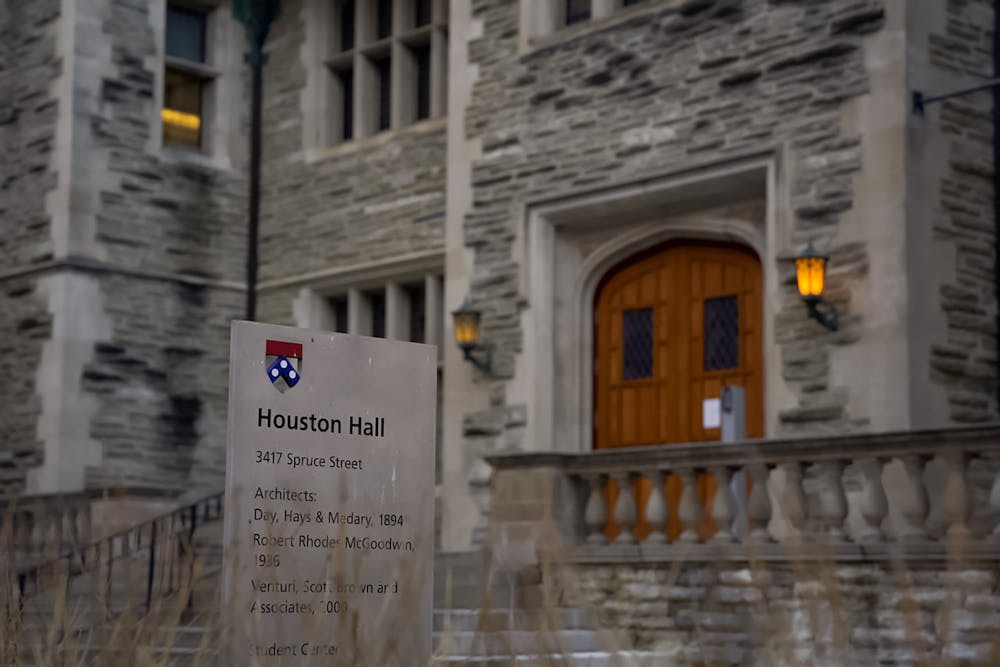
David Sanger, the White House and National Security correspondent for The New York Times, delivered the annual Rena & Angelius Anspach Lecture on Sept. 23 at Houston Hall.
Credit: Roger GeDavid Sanger, the White House and National Security correspondent for The New York Times, cited Russia and China as the focal points that will shape American foreign policy over the coming decades at the annual Rena & Angelius Anspach Lecture on Monday night.
The lecture, held in Houston Hall’s Hall of Flags, focused on the implications of the 2024 presidential election for United States foreign policy. Sanger frequently referred to his book “New Cold Wars: China’s Rise, Russia’s Invasion, and America’s Struggle to Defend the West,” which was published this year, to explain how the partnership between Russia and China will become the defining force behind American foreign policy for the foreseeable future.
The Anspach Lecture brings notable speakers to Penn to discuss current topics in international relations, according to Browne Center administrative coordinator and lecture organizer Anne Kalbach.
Sanger, one of The Times’ longest-serving correspondents, has won three Pulitzer Prizes over 40 years spent covering national security and politics.
“It’s difficult to imagine someone better suited to comment on this crucially important issue,” Browne Center director Edward Mansfield said during his introduction, adding that Sanger has covered foreign policy, globalization, nuclear proliferation, and Asian affairs across his career.
In his lecture, Sanger highlighted his belief that the election will be a turning point in how American foreign policy against Russia and China is established. He said that the growing partnership between Russia and China “is now likely to be the situation for the next 30 or 40 years.”
“We are seeing a new Iron Curtain drop,” Sanger said. “It’s become a platitude now to say that this is one of the most important elections in American history, but this time, I actually think they’re right.”
He added that the election will also define future American foreign policy on a larger scale than just toward Russia and China, including “the way we view America’s role in the world.”
According to Sanger, the 2024 election cycle has not put enough focus on the long-term issue of the growing power of the Russia-China partnership. He said that the focus has mainly been on short-term, “right-in-front-of-your-face” issues and that discussions of “long-range American power” are absent from campaign-trail conversations.
“We’re back to some of the same debates we had in the early days of the Cold War, which is, what’s the right strategy with a country that has fundamentally declared that it’s your adversary?” Sanger told The Daily Pennsylvanian after the event.
He added that even if the discussion of the “New Cold War” successfully enters the political mainstream, the next steps for policy will be hard to determine.
Sanger’s lecture received praise from members of the crowd of nearly 150 undergraduate students gathered in Houston Hall, many of whom scribbled down notes as Sanger spoke.
College first year Paul Beblavý said that he enjoyed the lecture, especially Sanger’s nonpartisan approach to its topics.
“[Sanger] tried to make an objective analysis of what each candidate would do, which I really like, because it’s pretty hard to understand the current foreign policy trajectory of the U.S.,” he said.
The Monday lecture marked the second Anspach lecture Sanger has given at Penn. His first lecture, given in October 2016, analyzed the 2016 presidential election’s implications and criticized a “sea of contradictions” within the foreign policy plans of 1968 Wharton graduate and then-presidential candidate Donald Trump.
College first year Eden Liu said that Sanger’s lecture had particular importance to him as an international student.
“As a person from Taiwan, foreign policy is literally the difference between whether my state survives or not, so this is a very near and dear issue,” he said.
When asked what Penn students should take away from the election, Sanger commented on how lucky Penn students are to be living “in just the right place, just the right state, at just the right moment.”
“You know, the next four or five weeks are going to be emblazoned in your minds for the rest of your lives,” he said. “For good or ill, we don’t know yet, but I can’t remember an election this interesting when I was going to college.”
The Daily Pennsylvanian is an independent, student-run newspaper. Please consider making a donation to support the coverage that shapes the University. Your generosity ensures a future of strong journalism at Penn.
Donate






